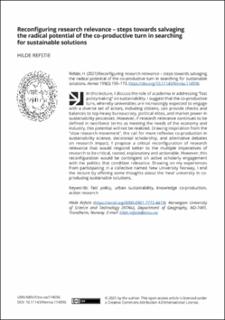Reconfiguring research relevance – steps towards salvaging the radical potential of the co-productive turn in searching for sustainable solutions
| dc.contributor.author | Refstie, Hilde | |
| dc.date.accessioned | 2023-03-03T06:57:01Z | |
| dc.date.available | 2023-03-03T06:57:01Z | |
| dc.date.created | 2022-07-26T09:05:34Z | |
| dc.date.issued | 2022 | |
| dc.identifier.citation | Fennia. 2022, 199 (2), 159-173. | en_US |
| dc.identifier.issn | 0015-0010 | |
| dc.identifier.uri | https://hdl.handle.net/11250/3055559 | |
| dc.description.abstract | In this lecture, I discuss the role of academia in addressing “fast policymaking” on sustainability. I suggest that the co-productive turn, whereby universities are increasingly expected to engage with a diverse set of actors, including citizens, can provide checks and balances to top-heavy bureaucracy, political elites, and market power in sustainability processes. However, if research relevance continues to be defined in neoliberal terms as meeting the needs of the economy and industry, this potential will not be realized. Drawing inspiration from the “slow research movement”, the call for more reflexive co-production in sustainability science, decolonial scholarship, and alternative debates on research impact, I propose a critical reconfiguration of research relevance that would respond better to the multiple imperatives of research to be critical, rooted, explanatory and actionable. However, this reconfiguration would be contingent on active scholarly engagement with the politics that condition relevance. Drawing on my experiences from participating in a collective named New University Norway, I end the lecture by offering some thoughts about the ‘new’ university in co-producing sustainable solutions. | en_US |
| dc.language.iso | eng | en_US |
| dc.publisher | Geographical society of Finland | en_US |
| dc.rights | Navngivelse 4.0 Internasjonal | * |
| dc.rights.uri | http://creativecommons.org/licenses/by/4.0/deed.no | * |
| dc.title | Reconfiguring research relevance – steps towards salvaging the radical potential of the co-productive turn in searching for sustainable solutions | en_US |
| dc.title.alternative | Reconfiguring research relevance – steps towards salvaging the radical potential of the co-productive turn in searching for sustainable solutions | en_US |
| dc.type | Peer reviewed | en_US |
| dc.type | Journal article | en_US |
| dc.description.version | publishedVersion | en_US |
| dc.source.pagenumber | 159-173 | en_US |
| dc.source.volume | 199 | en_US |
| dc.source.journal | Fennia | en_US |
| dc.source.issue | 2 | en_US |
| dc.identifier.doi | 10.11143/fennia.114596 | |
| dc.identifier.cristin | 2039537 | |
| cristin.ispublished | true | |
| cristin.fulltext | original | |
| cristin.qualitycode | 1 |
Files in this item
This item appears in the following Collection(s)
-
Institutt for geografi [1026]
-
Publikasjoner fra CRIStin - NTNU [37304]

